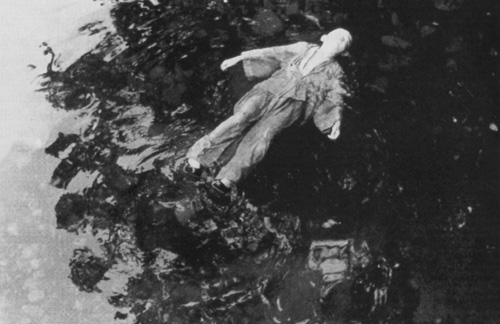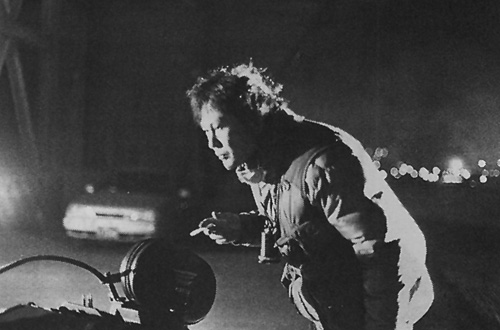a film by Bae Yang-Kyun
in Korean with subtitles, 135 minutes.
Milestone Film and Video (212) 865-7449
Now playing at select theaters.
Video available in late 1994.
To title anything—a poem, a painting, a novel, or a film—with a well-known Zen koan (a riddle or nonlogical formulation) is to invite incredulity, tough scrutiny, and rigorous comparisons. It would be, to say the least, a brave gesture for most artists. But to attempt to embody the challenge of the koan itself in the work as well begins to suggest hubris—or genius.
The Japanese have a tradition of poetry called shiketsu, a beyond words method of expressing the heart of Zen. Why Has Bodhidharma Left for the East? may perhaps be the first major shiketsu film; it is certainly an ambitious attempt. “The film doesn’t deal with God, but with people who suffer—prisoners of the links created by birth and death,” is how Korean filmmaker Bae Yong-Kyun describes this very personal meditation on one of the better-known koans (kung-ans in Korean).

On the surface, the film is a nearly nonverbal story of a small mountain monastery in modern Korea. There’s an elderly Zen master (Hyegok), his young disciple (Kibong), and an orphan child (Haejin). There is also a bluejay, an ox, a ceremony, death, and departure, but so little action or dialogue that these elements merely serve as brushstrokes on a canvas that seems to include the audience as well. We see that each of the characters has his own perception of the nature of existence: Hyegok, who knows that death is near; Kibong, who is still attached to his sense of obligations; and Haejin, an innocent child who learns about suffering and death. There are references to class issues and Korea’s shamanist spirit that may be missed by Western viewers, but a poignant contrast of a monastery life rich in Korean tradition with a faceless and relentless industrial city will be familiar to anyone who struggles with modern life. The film also suggests that the conflict between a contemplative life and a socially engaged one is recognized and unresolved in Korea.
The key element is the elasticity of time and perspective that film affords, a dreamlike alternative view of ordinary things. In a way, Zen becomes the setting, not the subject. And much as in a temple, such a setting can become an environment in which to first become quiet and contemplative, and possibly then to make the nonintellectual leap to a realization of reality. For some, it can also be, well…boring. At over two hours, this film tests one’s dedication and attention, not unlike a period of Zen meditation. It is, however, quite beautifully photographed, and there is a lyrical and precise quality to the scenes, which are mostly set in a lush, mountainous area of Korea.
The film raises compelling issues about the nature of media and the need and ability to express, or even evoke, awareness and realization. Bae, a painter and fine arts professor in Korea, has a feel for documentary and, in order to avoid even the slightest identification with Western-style cinema, uses nonprofessional actors and a stillness of camera reminiscent of the great Japanese filmmaker Ozu. It helps that what little dialogue is heard is in Korean; we have no basis on which to judge the delivery, other than the content we read in the subtitles. To some extent, the power of this film in the West comes from its very foreignness; it is questionable whether this would work here if the characters spoke in English. The less that is concrete and recognizable the better, the more likely we will surrender intellectual command and just watch and experience. Indeed, Why Has Bodhidharma Left for the East? doesn’t suffer from preaching, preciousness, or sanctimony, the deadly sins of other works attempting to present “truth.” In fact, there is no attempt to convince us of anything; we are just shown some inconsequential and ephemeral beings, acts, and objects, and we’re free to find a place to view it all: from the outside, from the point of view of someone on screen, or from within.
a film by Bae Yang-Kyun
in Korean with subtitles, 135 minutes.
Milestone Film and Video (212) 865-7449
Now playing at select theaters.
Video available in late 1994.
A Conversation With Bae Yong-Kyun
This interview was conducted for Tricycle in Korean by Frank M. Tedesco and Jinsuk Lim. It took place in the city of Taegu, a three-hour train ride from Seoul, where Bae was on location for his new film.
Tricycle: Why did you title your movie Why Has Bodhidharma Left for the East?

Bae: Bodhidharma was an Indian monk who went to China and founded Zen Buddhism. The koan “Why has Bodhidharma come from the West?” came from this. The title of the movie was this koan modified. A koan is a kind of enigmatic question from one’s master as a means of practice when he or she does Zen meditation. This cannot be solved with our intellect [knowledge]. It is only possible when the practitioner empties his or her mind completely and meets with one’s spiritual root. I used this title hoping that the film would be a kind of koan. I hope people see my film through deep meditation, not with intellectual understanding.
Tricycle: What was your inspiration for the film?
Bae: For quite a long time, industrial development was Korea’s social ideal. In the course of industrialization, we neglected the beauty of our own traditional culture and became more Westernized than Westerners themselves. My awareness of this tragedy led me to produce Bodhi.
Tricycle: Why did it take almost ten years to make Bodhi?
Bae: I first thought of making this movie in the early eighties. I had a concrete plan about the movie then, but it took me a long time to realize it in a movie. It took ten years from conception to completion. I had no real experience or opportunity in the Korean movie industry. I began this movie on my own, totally independently, and had to take care of everything myself, buying camera equipment, for example, writing the script (my original screenplay), finances, etc. All the actors in this movie were amateurs. So I had to train them, find appropriate shooting sites, shoot the film. That’s why it took such a long time.
Tricycle: Did time help you or hinder your creativity?
Bae: It is impossible for anyone to work on something for ten years without feeling passionate and committed. However, this passion and concentration can create very powerful energy in oneself. I think my energy can be transmitted to others through this movie. That it took a long time for me to complete the film helped the movie in a sense. But time doesn’t necessarily guarantee a masterpiece.
Tricycle: In the film women play a minor role. Why is this?
Bae: I was asked the same question in Europe and the States. One American professor faxed me a questionnaire and asked, “There are no women in your movie. Does it in any way criticize women’s status in Korean society?” In Europe, I was asked, “Why there are no women? Are you a male chauvinist?” Nonsense! I happened to choose a small bhikkhu hermitage for the site of my movie in a remote mountain area. Monks and nuns do not practice together in traditional Buddhism. Naturally, there was no reason for a woman to appear in it. I didn’t intend to exclude women. On the other hand, I did not want to create a love story for commercial purposes. It is not true every time, but women are often used for commercial effect in movies. If the hermitage had been a nun’s practice center there would have been no men.
Tricycle: Why did you make a Buddhist film?
Bae: I didn’t make this movie with a special purpose in mind. Making a movie is different than constructing a building. Art cannot be created for utilitarian reasons. I love Buddhism. I experienced great anguish and inner conflict in my high school days. I became very critical about the rigid educational system in junior high school. Students are expected to study very hard to get into a good high school and study even harder to get into a prestigious college. I couldn’t accept this as my goal in life. Korean schools program students to accept society’s standards. My inner struggle grew worse and worse, and I became nihilistic about worldly life. When I look back on those days, I think it was a very meaningful period of conflict and negativity. Sometimes we have to give up what we hold dear in order to learn the truth in Buddhism. When I went to college, everything changed. I entered a fine arts department and I had more freedom there. I overcame my sense of oppression and became interested in Buddhism.
I read books about Buddhism and took great interest in the spiritual and cultural aspects of the religion. Since I am a Korean who was born and raised in a Buddhist culture and tradition, I think I was influenced by it unconsciously. Korean tradition was influenced by Confucianism but at the same time was greatly influenced by Buddhism for a long period of time. I can say I met Buddhism at a conscious level in my college years. What is interesting is that most Koreans receive very Westernized educations; that is, we as Koreans learn a lot about the West before we learn about our own culture. Because of this we have a tendency to encounter Buddhism later in life than Westerners do.
Tricycle: Do you consider yourself a Buddhist?
Bae: I don’t think I am qualified to call myself a Buddhist. The word “Buddhist” burdens me. I’m afraid to call myself a Buddhist because belief cannot be attained easily nor can it be measured. But I have great interest in Buddhist spirituality. Besides, Zen Buddhism is very different from what we know as religion. Zen Buddhism is not dogmatic, and it does not have a god for people to believe in. Therefore, I often have difficulty in using terms such as “religion” or “believer” when talking about Zen Buddhism. The ten years I committed to the making of Bodhi were a kind of practice for me. The world created as a result of that practice was meditative, serene, but it was a severe ordeal to me physically, financially, and spiritually. Even though I didn’t practice conventionally, the process of creating that movie was like holding a koan in one’s mind.
Tricycle: Some people say that your movie is hard to understand. How do you answer them?
Bae: Let’s think about a beautiful twilight. If the beauty of it has to be explained, analyzed to be understood, it cannot be appreciated. We can simply enjoy the beautiful twilight without explanation. Zen is like that. I didn’t intend to make the film a textbook for Buddhist philosophy. I just wanted to share the experience of Zen with others through my movie.
Thank you for subscribing to Tricycle! As a nonprofit, we depend on readers like you to keep Buddhist teachings and practices widely available.